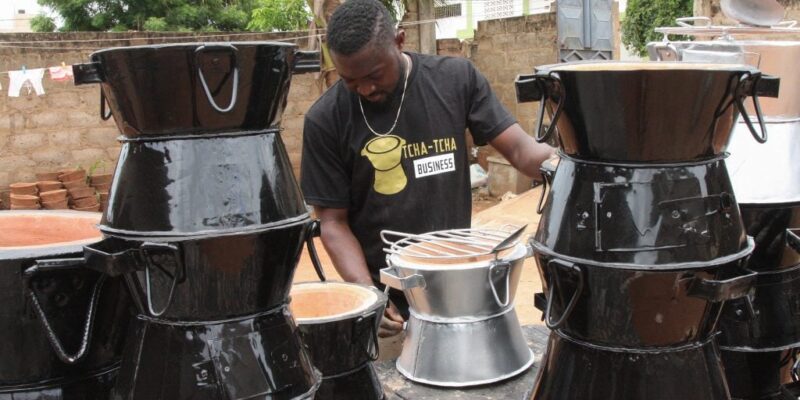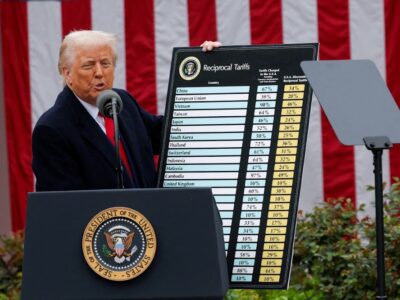
Ministers and high-level representatives from dozens of countries gathered in Paris earlier this month for the Summit on Clean Cooking in Africa. The event, convened by the International Energy Agency, the African Development Bank and the governments of Tanzania and Norway, marks one of the first times that the often-overlooked problem of clean cooking access has risen so high up the diplomatic agenda.
Around one billion people in Africa – 80% of the continent’s population – are unable to cook using clean burning fuels. Firewood, coal, charcoal, kerosene or animal dung – which release toxic fumes when burned – are typically used instead. This can cause various health problems, ranging from pneumonia to heart disease and lung cancer. In fact, household air pollution is estimated to be the second-leading cause of death in Africa.
Meanwhile the collection of firewood is a major driver of deforestation and, indirectly, of climate change. And the gender dimensions of the problem are stark – it is women and children who are often forced to spend hours each day collecting firewood, and who suffer the bulk of the health effects from noxious fumes.
“Successfully advancing the clean cooking agenda in Africa would contribute towards protecting the environment, climate, health and ensuring gender equality,” said Tanzanian president Samia Suluhu Hassan at the summit.
Carbon markets struggle
Africa has been lagging behind other parts of the world in addressing clean cooking access, although a growing number of companies have been entering the market with solutions in recent years. This can involve involve providing stoves that burn fuel more efficiently, or stoves that are designed to use cleaner sources of fuel or even electricity.
Many of these companies have been relying on generating revenues from the sale of carbon credits – based on the logic that clean cooking reduces the burning of carbon-intensive fuels and prevents deforestation – to make their business models work. Unclean cooking is estimated to be responsible for 2% of global emissions.
Karl Skare, chief product and strategy officer at d.light – a company that provides fuel-efficient stoves – says that “carbon credits play a vital role in enabling businesses like d.light to offer clean cooking products at highly subsidised prices”.
“Clean cookstoves can be sold without any subsidies at all,” adds Skare, “but the higher price point significantly reduces affordability and the scale of impact that can be achieved.”
The problem for companies relying on carbon credit revenues is that the carbon markets have been taking a sustained reputational battering. Various scandals involving schemes with flawed methodologies have attracted extensive media coverage.
To make matters worse, clean cooking carbon offset projects have been singled out for criticism. Research published in the journal Nature Sustainability in January warned of “pervasive overcrediting”, with the clean cooking projects analysed by the researchers found to be exaggerating their impact in reducing emissions by nearly 1,000%.
According to the non-profit Clean Cooking Alliance, the average carbon credit spot price for clean cookstoves and other household devices fell to just $5.90 per tonne of CO2 equivalent in 2023 – a 38% decline from the previous year. “The broad decline in market prices has worsened project economics and made it harder to reach agreements with potential investors to initiate and scale clean cooking projects,” Skare laments.
James Rockall, CEO of the World Liquid Gas Association (WLGA), acknowledged to African Business that the voluntary carbon markets will not “bring us the same kind of revenue as we’d hoped”. Demonstrating carbon reduction is a “tough process”, he says, although he adds that using liquified petroleum gas (LPG) produces huge carbon savings compared to fuels such as wood and charcoal.
The WLGA announced a new initiative, the ‘Cooking for Life Africa Task Force’ at the Paris Summit. The task force, which includes major gas companies Equinor and TotalEnergies, will look for ways to accelerate the use of LPG in clean cooking in Africa. The fuel is already widely used in North Africa and Rockall sees “great potential” to expand its deployment south of the Sahara if governments can provide better infrastructure and speed-up permitting.
Restoring credibility?
The Paris Summit alone will not be a game changer. The IEA said that the summit had mobilised financial pledges totalling $2.2bn – a fraction of the $4bn needed every year to achieve universal clean cooking access by 2030.
Potentially more promising are the initiatives intended to address criticisms of the role of clean cooking projects in carbon offsetting. These efforts are part of a broader push to rescue the credibility of the voluntary carbon market through various new standards, certification schemes and methodologies.
One of the challenges for clean cooking is that it is difficult to accurately monitor how a new cookstove is used. A company might provide a household with a cookstove, and state that its use will reduce emissions by a certain amount, in order to sell carbon credits. Unless the company can collect data on how the cookstove is used in practice, however, buyers of these credits have little certainty about how much emissions are really being avoided.
Tom Price, CEO of cookstove developer EcoSafi, is attempting to confront this problem. He says that EcoSafi’s business model revolves around providing a highly subsidised cookstove. “Truly clean cookstoves are not cheap,” he says. “Not surprisingly, people with limited incomes can’t afford them.”
The company generates income by selling fuel for the stove in the form of biomass fuel pellets that Price says are 95% cleaner than charcoal but cost its customers only half as much.
A key differentiator for EcoSafi is that, because it also provides the fuel used in its cookstoves, it is able to accurately track how much its stoves are being used – and, therefore, the carbon savings that they are achieving.
“A carbon offset generated by someone giving away a stove and not being able to track how it’s being used is fundamentally different from one like ours, where we track every kilo of fuel to the customer and now we can track the stove actually being used.”
Earlier this month, EcoSafi became the first company to issue credits in Africa under the ‘Metered and Measured Energy Cooking Devices’ methodology developed by standard-setting organisation Gold Standard. It is also the first cookstove project developer to receive an ‘A’ rating, indicating a high likelihood that its credits achieve a tonne of CO2 avoided or removed, from carbon credit ratings agency BeZero Carbon. This is the third-highest available score on BeZero’s scale, which runs from AAA to D.
Price points to data showing that the price of credits sold by cookstove projects is diverging, with higher-rated projects actually benefitting from a price rise in the last year. EcoSafi says it has already received an offer of $30 for its first tranche of credits – a significant premium on the average price that cookstove developers can expect.
Cookstove developers that rely on carbon finance are, to some extent, reliant on factors beyond their control. The price they can generate from credits will depend partly on broader confidence in carbon offsetting as a tool to combat climate change.
Nevertheless, if clean cooking project developers can convince credit purchasers that their methodologies are robust, then they can offer an “incredibly affordable way to have highly provable impact”, says Price. And, if companies like EcoSafi can scale-up, he sees a “staggering business opportunity”, with a potential market amounting to “hundreds of millions of households” in Africa.










Comments